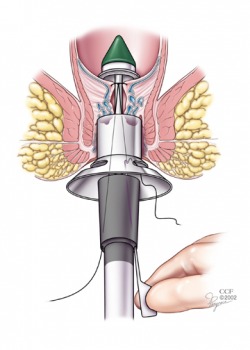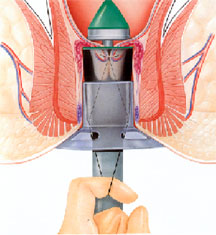Hemorrhoid Surgery
Main
Contents
Cause Of Hemorrhoid
Hemorrhoid Symptoms
Internal Hemorrhoids
External Hemorrhoids
Bleeding Hemorrhoids
Hemorrhoid Relief
Hemorrhoid Surgery
Hemorrhoid Treatments And Cures
Hemorrhoid Symptoms
Internal Hemorrhoids
External Hemorrhoids
Bleeding Hemorrhoids
Hemorrhoid Relief
Hemorrhoid Surgery
Hemorrhoid Treatments And Cures
More
Side Effects of Hemorrhoidectomies
Patients who undergo hemorrhoidectomies always experience pain in the following weeks. While surgery is intended to be a long-term solution, the pain is definitely something to consider, especially since hemorrhoids can return after surgery. Besides, the main reason people seek hemorrhoids surgery is to ease the pain.
Another common side effect of hemorrhoidectomies is the inability to urinate after surgery. This is so common that hospitals will not even release patients until they have successfully urinated. Less likely, although still possible, consequences of a hemorrhoidectomy include the loss of bladder or bowel control, hematomas, and infections.
Patients who undergo hemorrhoidectomies always experience pain in the following weeks. While surgery is intended to be a long-term solution, the pain is definitely something to consider, especially since hemorrhoids can return after surgery. Besides, the main reason people seek hemorrhoids surgery is to ease the pain.
Another common side effect of hemorrhoidectomies is the inability to urinate after surgery. This is so common that hospitals will not even release patients until they have successfully urinated. Less likely, although still possible, consequences of a hemorrhoidectomy include the loss of bladder or bowel control, hematomas, and infections.
Hemorrhoid Surgery
Hemorrhoid surgery is the last line of defense against a hemorrhoid. Most hemorrhoids can be treated and cured with more conservative treatments - oral medication and application of ointments, but others must be dealt with surgically. In almost all cases, herbs may be able to provide the solution. Look through all pages of this web site and gain a firm understanding of how and which herbs can be used to cure hemorrhoids as well as to soothe them. Most of the physicians suggest hemorrhoid surgery only in cases where the hemorrhoid is very painful and are likely to cause further complications, there for leaving surgery the only option. The main aim of hemorrhoid surgery is to give early relief and avoid possible future complications. Mainly patients with prolapsed hemorrhoids (advanced stage of internal hemorrhoids) are advised to undergo hemorrhoid surgery. Hemorrhoids surgery comes in about a half dozen varieties, using techniques like injection, cauterization, freezing, laser and infrared light. One hemorrhoid treatment uses rubber bands and another uses staples. Usually, your doctor will offer you a solution that is dependant on their background experience and training, as well as the symptoms of your hemorrhoid.
If the hemorrhoids are sticking out of the anus most of the time, wont go back inside unless forced to, it is too late for the simple procedures. This type of hemorrhoid is medically described as a grade 3 or 4 hemorrhoid. You will more than likely require an operation, which surgically removes the hemorrhoids and surrounding tissue. Surgically cutting the hemorrhoids out is called a hemorrhoidectomy or excisional hemorrhoidectomy and sometimes incisional hemorrhoidectomy, and is often spelt in many different ways, such as hemorhoidectomy, haemorrhoidectomy, hemmorhoidectomy or hemroidectomy, done primarily by scalpel or laser and with the help of local anesthesia. Normally, this method of hemorrhoid surgery is performed in more painful and itchy hemorrhoids. The only disadvantage of this type of hemorrhoid surgery is that patient may have to be hospitalized. This hemorrhoid treatment, though, also has the highest long term success rate with eliminating hemorrhoids.
The first step you should take when you are facing a hemorrhoidectomy, is to discuss with your surgeon or doctor the hemorrhoid treatments you are currently using, herbs, pain suppressants, risks and complications of the operation and so on. For example, banding carries a very minute risk of paralysis. Other hemorrhoidectomy complications can include bleeding, infection, narrowing of the anal canal, urinary retention, non-healing wounds, anal fissure (cut that may require surgery to fix), anal fistulae (anal glands get blocked from draining into the anal canal and this may result in puss breaking through the skin surface as an abscess). Some of hemorrhoid treatments or home remedies may need to be stopped several weeks before the hemorrhoidectomy surgery, because they may interact in a negative way with other medications you will be given before, during or after the hemorrhoidectomy. In around 1.5% of cases, hemorrhoids are recurring. And sometimes, a hemorrhoidectomy isn't even viable, most likely because of the damage it could do.
Before the operation, you will be given a laxative, or more commonly, you will experience an enema (a simple procedure - water is injected into the rectum and then flushed out, cleaning the area). A local anesthetic is commonly used along with a sedative, so the hemorrhoidectomy won't be as distressing. You can choose not to remain consciousness during the hemorrhoidectomy. You might consider asking your physician about a general anesthetic to knock you out. The hemorrhoidectomy involves using a scalpel or a laser beam to cut the hemorrhoids and hemorrhoid tissue out. Some surgeons then stitch the area together using absorbable stitches, while other surgeons may choose to leave it as an open wound, believing that after a hemorrhoidectomy, the insertion of stitches would more likely lead to an infection.
Recovery and healing may take little longer time. In rare cases, misadministration of hemorrhoid surgery may lead to profuse bleeding and scarring which may create complications. During the recovery phase, the operation wound is often left open to heal on its own. A couple of weeks after the surgery, things will be quite unpleasant and painful, and full healing will be completed in three-four weeks. Allow around a week before you return to work following an excisional hemorrhoidectomy and, discuss your work with your doctor to see if you need more time off work, or whether you need limited or lighter duties at first when going back to work.
If you are looking for a quick solution with no reading or learning involved, something you can just buy online, like pills, then you might be interested in ClearMed. If money is tight, then try ClearMed and change your diet (also see the causes of hemorrhoids page).
You should know that if your doctor or surgeon has suggested a hemorrhoidectomy, you are facing a serious problem. You have to do more than just get rid of the hemorrhoids, you need to heal the hemorrhoidal tissue or else new hemorrhoids could develop almost immediately - which is why we suggest the ClearMed as the first choice as a natural hemorrhoid treatment after a hemorrhoidectomy. Also, after the operation, you may be given painkillers and stool softeners and may be asked to take Seitz baths at home.
If the hemorrhoids are sticking out of the anus most of the time, wont go back inside unless forced to, it is too late for the simple procedures. This type of hemorrhoid is medically described as a grade 3 or 4 hemorrhoid. You will more than likely require an operation, which surgically removes the hemorrhoids and surrounding tissue. Surgically cutting the hemorrhoids out is called a hemorrhoidectomy or excisional hemorrhoidectomy and sometimes incisional hemorrhoidectomy, and is often spelt in many different ways, such as hemorhoidectomy, haemorrhoidectomy, hemmorhoidectomy or hemroidectomy, done primarily by scalpel or laser and with the help of local anesthesia. Normally, this method of hemorrhoid surgery is performed in more painful and itchy hemorrhoids. The only disadvantage of this type of hemorrhoid surgery is that patient may have to be hospitalized. This hemorrhoid treatment, though, also has the highest long term success rate with eliminating hemorrhoids.
The first step you should take when you are facing a hemorrhoidectomy, is to discuss with your surgeon or doctor the hemorrhoid treatments you are currently using, herbs, pain suppressants, risks and complications of the operation and so on. For example, banding carries a very minute risk of paralysis. Other hemorrhoidectomy complications can include bleeding, infection, narrowing of the anal canal, urinary retention, non-healing wounds, anal fissure (cut that may require surgery to fix), anal fistulae (anal glands get blocked from draining into the anal canal and this may result in puss breaking through the skin surface as an abscess). Some of hemorrhoid treatments or home remedies may need to be stopped several weeks before the hemorrhoidectomy surgery, because they may interact in a negative way with other medications you will be given before, during or after the hemorrhoidectomy. In around 1.5% of cases, hemorrhoids are recurring. And sometimes, a hemorrhoidectomy isn't even viable, most likely because of the damage it could do.
Before the operation, you will be given a laxative, or more commonly, you will experience an enema (a simple procedure - water is injected into the rectum and then flushed out, cleaning the area). A local anesthetic is commonly used along with a sedative, so the hemorrhoidectomy won't be as distressing. You can choose not to remain consciousness during the hemorrhoidectomy. You might consider asking your physician about a general anesthetic to knock you out. The hemorrhoidectomy involves using a scalpel or a laser beam to cut the hemorrhoids and hemorrhoid tissue out. Some surgeons then stitch the area together using absorbable stitches, while other surgeons may choose to leave it as an open wound, believing that after a hemorrhoidectomy, the insertion of stitches would more likely lead to an infection.
Recovery and healing may take little longer time. In rare cases, misadministration of hemorrhoid surgery may lead to profuse bleeding and scarring which may create complications. During the recovery phase, the operation wound is often left open to heal on its own. A couple of weeks after the surgery, things will be quite unpleasant and painful, and full healing will be completed in three-four weeks. Allow around a week before you return to work following an excisional hemorrhoidectomy and, discuss your work with your doctor to see if you need more time off work, or whether you need limited or lighter duties at first when going back to work.
If you are looking for a quick solution with no reading or learning involved, something you can just buy online, like pills, then you might be interested in ClearMed. If money is tight, then try ClearMed and change your diet (also see the causes of hemorrhoids page).
You should know that if your doctor or surgeon has suggested a hemorrhoidectomy, you are facing a serious problem. You have to do more than just get rid of the hemorrhoids, you need to heal the hemorrhoidal tissue or else new hemorrhoids could develop almost immediately - which is why we suggest the ClearMed as the first choice as a natural hemorrhoid treatment after a hemorrhoidectomy. Also, after the operation, you may be given painkillers and stool softeners and may be asked to take Seitz baths at home.






